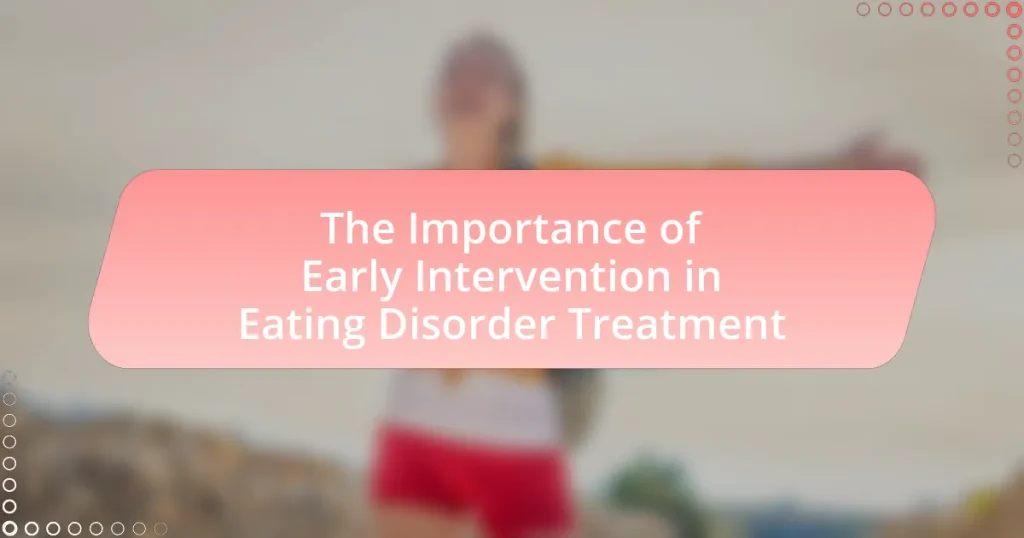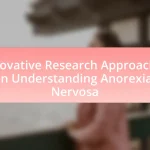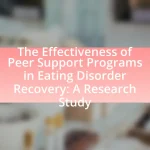Early intervention in eating disorder treatment is essential for improving recovery rates and minimizing health risks. Research shows that individuals who receive treatment within the first year of onset have a recovery rate of up to 70%, while delaying treatment can lead to severe physical and psychological complications. Key components of effective early intervention include early identification, family involvement, nutritional rehabilitation, and psychological support through therapies such as cognitive-behavioral therapy. The article explores the critical role of timely intervention across various eating disorders, the barriers to accessing care, and the importance of education and advocacy in promoting early treatment.
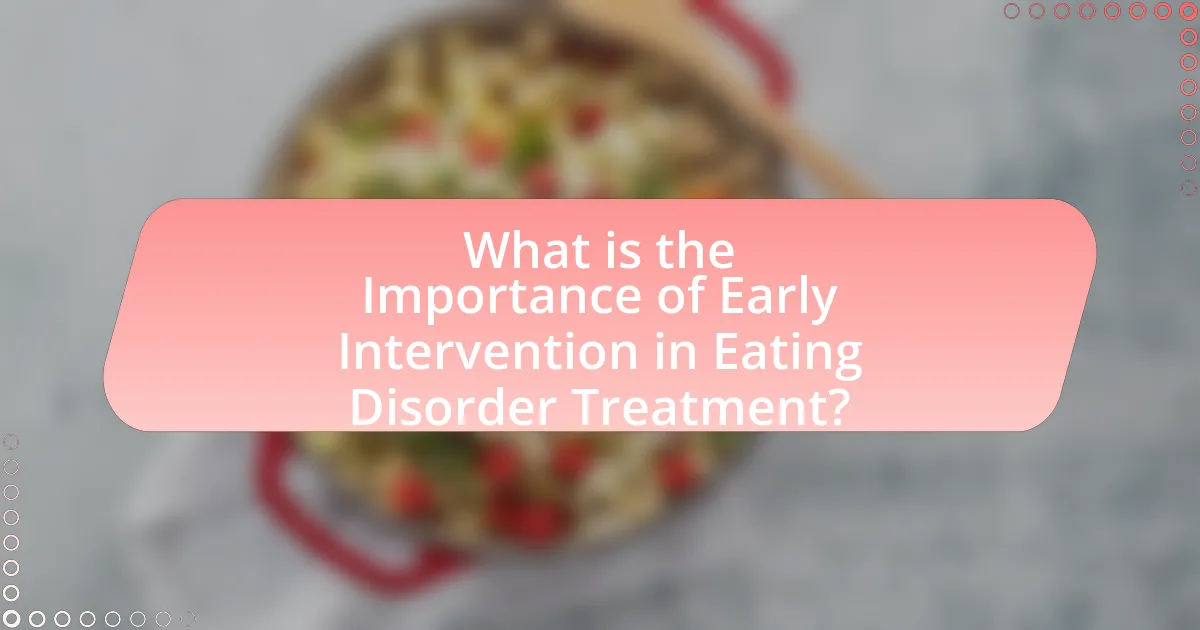
What is the Importance of Early Intervention in Eating Disorder Treatment?
Early intervention in eating disorder treatment is crucial because it significantly increases the chances of recovery and reduces the risk of severe health complications. Research indicates that individuals who receive treatment within the first year of onset have a higher likelihood of achieving full recovery, with studies showing recovery rates of up to 70% when intervention occurs early. Additionally, early treatment can prevent the progression of the disorder, which is associated with more complex psychological and physical health issues, including heart problems and osteoporosis. Therefore, timely intervention not only enhances recovery outcomes but also mitigates long-term health risks associated with eating disorders.
Why is early intervention critical in the treatment of eating disorders?
Early intervention is critical in the treatment of eating disorders because it significantly increases the likelihood of recovery and reduces the risk of severe health complications. Research indicates that individuals who receive treatment early in the course of their eating disorder have a higher chance of achieving full recovery, with studies showing that early intervention can lead to a recovery rate of up to 70%. Additionally, delaying treatment can result in the development of more severe psychological and physical health issues, including heart problems, osteoporosis, and increased mortality rates. Therefore, timely intervention not only improves outcomes but also mitigates the long-term consequences associated with eating disorders.
What are the potential consequences of delaying treatment for eating disorders?
Delaying treatment for eating disorders can lead to severe physical and psychological consequences. Physically, individuals may experience malnutrition, electrolyte imbalances, and organ damage, which can result in life-threatening conditions. For instance, research indicates that prolonged malnutrition can lead to cardiac complications, with a study published in the Journal of Adolescent Health highlighting that 20% of individuals with anorexia nervosa may die from complications related to the disorder if untreated. Psychologically, delaying treatment can exacerbate symptoms such as anxiety, depression, and social isolation, making recovery more difficult. The National Eating Disorders Association emphasizes that early intervention significantly improves recovery rates, underscoring the critical need for timely treatment.
How does early intervention impact recovery outcomes?
Early intervention significantly improves recovery outcomes in individuals with eating disorders. Research indicates that timely treatment can lead to higher rates of full recovery, reduced symptom severity, and shorter treatment duration. For instance, a study published in the International Journal of Eating Disorders found that patients who received early intervention had a 50% higher likelihood of achieving full recovery compared to those who started treatment later. This underscores the critical role of early detection and intervention in enhancing the effectiveness of treatment and promoting long-term health.
What are the key components of early intervention in eating disorder treatment?
The key components of early intervention in eating disorder treatment include early identification, family involvement, nutritional rehabilitation, and psychological support. Early identification allows for timely diagnosis and initiation of treatment, which is crucial as research indicates that early intervention can significantly improve recovery outcomes. Family involvement is essential, as engaging family members can provide support and enhance treatment effectiveness. Nutritional rehabilitation focuses on restoring healthy eating patterns and addressing nutritional deficiencies, which is vital for physical recovery. Psychological support, including cognitive-behavioral therapy, addresses underlying mental health issues and promotes healthier coping mechanisms. These components collectively contribute to a comprehensive approach that enhances the likelihood of successful recovery from eating disorders.
What types of therapies are included in early intervention?
Early intervention for eating disorders typically includes cognitive-behavioral therapy (CBT), family-based therapy (FBT), and interpersonal therapy (IPT). CBT focuses on changing negative thought patterns and behaviors associated with eating disorders, while FBT involves the family in the treatment process to support the individual. IPT addresses interpersonal issues that may contribute to the disorder. Research indicates that these therapies are effective in improving outcomes for individuals with eating disorders, particularly when initiated early in the course of the illness.
How do healthcare professionals identify the need for early intervention?
Healthcare professionals identify the need for early intervention by assessing risk factors, symptoms, and patient history related to eating disorders. They utilize standardized screening tools, clinical interviews, and diagnostic criteria to evaluate the severity of the disorder and its impact on the patient’s physical and mental health. Research indicates that early identification significantly improves treatment outcomes, as noted in a study published in the Journal of Eating Disorders, which found that patients receiving early intervention had a 50% higher recovery rate compared to those who started treatment later.
What role do family and support systems play in early intervention?
Family and support systems play a crucial role in early intervention for eating disorders by providing emotional, psychological, and practical support to individuals in need. Research indicates that family involvement can significantly enhance treatment outcomes, as families can help identify symptoms early, encourage treatment adherence, and create a supportive environment conducive to recovery. A study published in the Journal of Eating Disorders found that family-based interventions led to higher recovery rates in adolescents with anorexia nervosa, highlighting the effectiveness of family engagement in the treatment process.
How can families recognize signs of eating disorders early?
Families can recognize signs of eating disorders early by observing significant changes in eating habits, weight fluctuations, and emotional behaviors. For instance, a noticeable decline in food intake, avoidance of certain food groups, or excessive focus on dieting can indicate potential issues. Additionally, behaviors such as frequent weighing, preoccupation with body image, and withdrawal from social activities related to food can serve as red flags. Research indicates that early detection is crucial, as studies show that early intervention can lead to better treatment outcomes and recovery rates. According to the National Eating Disorders Association, recognizing these signs promptly can significantly improve the chances of effective treatment and recovery.
What strategies can families use to support early intervention efforts?
Families can support early intervention efforts by actively engaging in open communication, fostering a supportive environment, and collaborating with healthcare professionals. Open communication allows family members to express concerns and share observations about eating behaviors, which is crucial for early detection of eating disorders. Creating a supportive environment involves promoting healthy eating habits and body positivity, which can mitigate the risk of developing disordered eating patterns. Collaboration with healthcare professionals, such as therapists and dietitians, ensures that families receive guidance on effective strategies and interventions tailored to their loved one’s needs. Research indicates that family involvement significantly enhances treatment outcomes in eating disorders, highlighting the importance of these strategies in early intervention efforts.
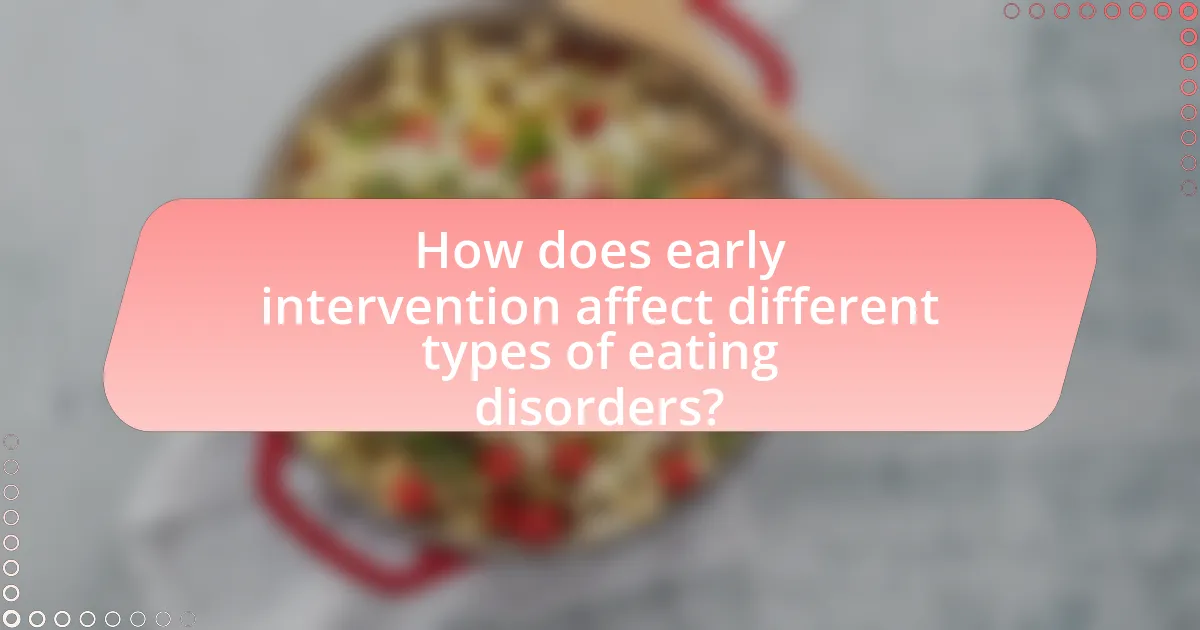
How does early intervention affect different types of eating disorders?
Early intervention significantly improves outcomes for individuals with various types of eating disorders, including anorexia nervosa, bulimia nervosa, and binge eating disorder. Research indicates that when treatment begins early, particularly within the first three years of onset, the likelihood of full recovery increases substantially. For instance, a study published in the Journal of Eating Disorders found that early intervention in adolescents with anorexia nervosa led to a recovery rate of over 80%, compared to lower rates for those who received treatment later. Additionally, early intervention can reduce the severity of symptoms and associated health complications, as evidenced by findings from the National Institute of Mental Health, which highlight that timely treatment can prevent the progression of eating disorders and improve overall mental health outcomes.
What specific benefits does early intervention provide for anorexia nervosa?
Early intervention for anorexia nervosa significantly improves treatment outcomes and reduces the risk of long-term health complications. Research indicates that individuals who receive early treatment are more likely to achieve full recovery, with studies showing that early intervention can lead to a recovery rate of up to 80% within a year. Additionally, early intervention helps to minimize the physical and psychological consequences associated with prolonged anorexia, such as cardiovascular issues and severe anxiety or depression. By addressing the disorder promptly, healthcare providers can implement effective therapeutic strategies that promote healthier eating behaviors and improve overall mental health, thereby enhancing the quality of life for those affected.
How does early treatment alter the course of anorexia nervosa?
Early treatment significantly improves the prognosis of anorexia nervosa by facilitating weight restoration and reducing the duration of the disorder. Research indicates that individuals who receive treatment within the first three years of onset have a higher likelihood of recovery, with studies showing that early intervention can lead to a recovery rate of up to 70% within a year. Furthermore, early treatment helps to mitigate severe medical complications associated with the disorder, such as cardiac issues and bone density loss, which can arise from prolonged malnutrition. The National Institute for Health and Care Excellence (NICE) emphasizes that timely intervention is crucial for preventing chronicity and improving overall outcomes in patients with anorexia nervosa.
What are the unique challenges in early intervention for anorexia nervosa?
Early intervention for anorexia nervosa faces unique challenges, primarily due to the complex nature of the disorder and the psychological resistance of affected individuals. Patients often exhibit denial about their condition, making it difficult for healthcare providers to engage them in treatment. Additionally, the stigma surrounding eating disorders can hinder open communication and support from family and friends, further complicating the intervention process. Research indicates that early intervention is crucial, as it significantly improves recovery outcomes; however, the reluctance to seek help and the need for specialized training among healthcare professionals to recognize early signs of anorexia remain significant barriers.
What advantages does early intervention offer for bulimia nervosa?
Early intervention for bulimia nervosa significantly increases the likelihood of recovery and reduces the severity of the disorder. Research indicates that individuals who receive treatment within the first year of onset have a higher chance of achieving remission, with studies showing that early intervention can lead to recovery rates of up to 70%. Additionally, early treatment can prevent the development of comorbid conditions such as anxiety and depression, which often accompany bulimia nervosa. By addressing the disorder promptly, healthcare providers can implement effective therapeutic strategies that mitigate long-term health complications, including electrolyte imbalances and gastrointestinal issues.
How does early intervention influence binge-purge cycles?
Early intervention significantly reduces the frequency and severity of binge-purge cycles in individuals with eating disorders. Research indicates that timely treatment can disrupt the progression of these cycles, leading to improved recovery outcomes. A study published in the Journal of Eating Disorders found that patients who received early intervention showed a 50% reduction in binge-purge episodes within three months compared to those who started treatment later. This evidence underscores the critical role of early intervention in mitigating the harmful effects of binge-purge behaviors and promoting healthier eating patterns.
What therapeutic approaches are most effective for bulimia nervosa in early stages?
Cognitive Behavioral Therapy (CBT) is the most effective therapeutic approach for bulimia nervosa in its early stages. CBT specifically targets the distorted thoughts and behaviors associated with eating disorders, helping individuals develop healthier eating patterns and coping mechanisms. Research indicates that CBT leads to significant reductions in binge-eating and purging behaviors, with studies showing that approximately 50-70% of patients experience substantial improvement after completing a course of CBT. Additionally, Family-Based Therapy (FBT) has also shown effectiveness, particularly in adolescents, by involving family members in the treatment process to support recovery. These approaches are supported by clinical guidelines and evidence from studies published in journals such as the “Journal of Consulting and Clinical Psychology,” which highlight their efficacy in early intervention for bulimia nervosa.
How does early intervention impact binge eating disorder?
Early intervention significantly improves outcomes for individuals with binge eating disorder by reducing the severity and duration of the disorder. Research indicates that timely treatment can lead to a higher likelihood of recovery, as early intervention addresses the underlying psychological and behavioral issues before they become entrenched. A study published in the Journal of Eating Disorders found that individuals who received early treatment showed a 50% reduction in binge eating episodes within three months, compared to those who started treatment later. This evidence underscores the critical role of early intervention in promoting healthier eating patterns and improving overall mental health for those affected by binge eating disorder.
What are the signs that indicate the need for early intervention in binge eating disorder?
Signs indicating the need for early intervention in binge eating disorder include frequent episodes of consuming large amounts of food in a short period, feelings of loss of control during these episodes, and experiencing distress or shame related to eating behaviors. Additionally, physical symptoms such as rapid weight gain, gastrointestinal issues, and fluctuations in weight can also signal the necessity for prompt treatment. Research indicates that early intervention can significantly improve outcomes, as untreated binge eating disorder can lead to severe psychological and physical health complications, including obesity, diabetes, and depression.
How can early intervention help in developing healthier eating patterns?
Early intervention can significantly aid in developing healthier eating patterns by addressing maladaptive behaviors before they become entrenched. Research indicates that early identification and treatment of disordered eating behaviors can lead to improved outcomes, as individuals are more receptive to change when interventions occur at an earlier stage. For instance, a study published in the Journal of Eating Disorders found that individuals who received early intervention showed a 50% reduction in eating disorder symptoms compared to those who received treatment later. This demonstrates that timely support can facilitate the adoption of healthier dietary habits and prevent the escalation of eating disorders.
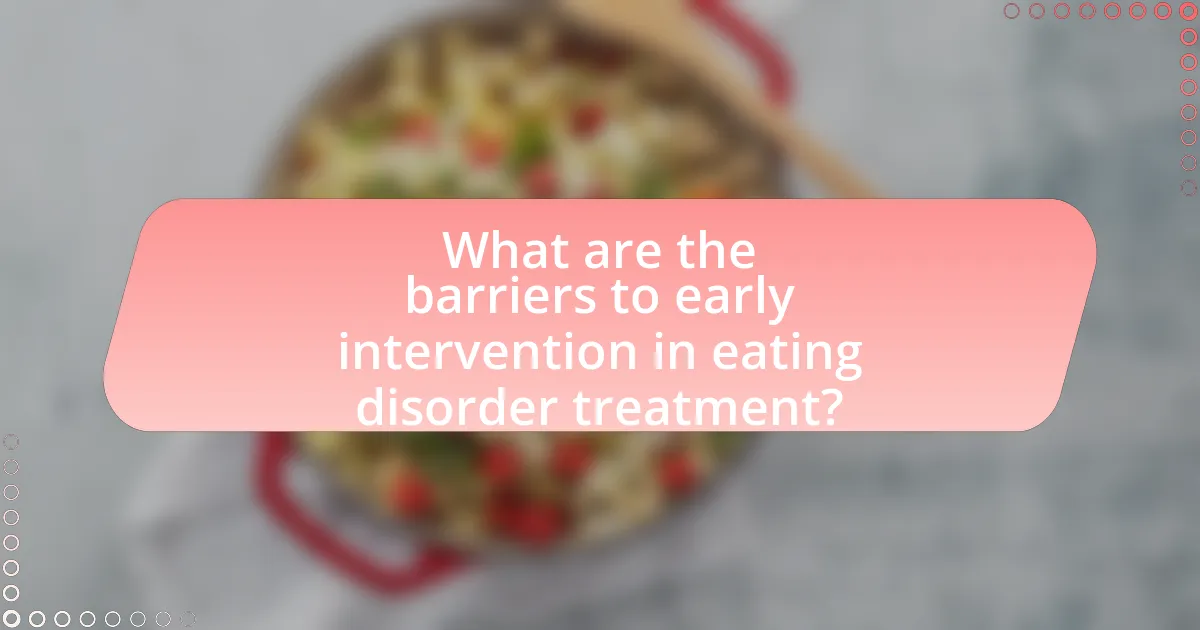
What are the barriers to early intervention in eating disorder treatment?
Barriers to early intervention in eating disorder treatment include stigma, lack of awareness, and limited access to specialized care. Stigma surrounding mental health issues often prevents individuals from seeking help, as they may fear judgment or misunderstanding from others. Additionally, many people, including healthcare providers, may lack awareness of the signs and symptoms of eating disorders, leading to delayed recognition and treatment. Furthermore, access to specialized care is often limited due to geographical constraints, financial barriers, or insufficient availability of trained professionals, which can hinder timely intervention. These factors collectively contribute to the challenges faced in addressing eating disorders early in their development.
What misconceptions exist about eating disorders that hinder early intervention?
Misconceptions about eating disorders that hinder early intervention include the belief that they only affect young women, that they are a choice rather than a serious mental health issue, and that individuals with eating disorders are always underweight. These misconceptions prevent timely recognition and treatment, as they lead to a lack of awareness among families and healthcare providers. For instance, research indicates that eating disorders can affect individuals of all genders and ages, with the National Eating Disorders Association reporting that 10 million men in the U.S. will experience a clinically significant eating disorder at some point in their lives. Additionally, the notion that eating disorders are merely lifestyle choices undermines the complex psychological and physiological factors involved, which can delay necessary intervention. Lastly, the stereotype that only underweight individuals suffer from these disorders ignores conditions like binge eating disorder, which can affect individuals of all body sizes, further complicating early detection and support efforts.
How do societal attitudes towards body image affect early intervention?
Societal attitudes towards body image significantly influence early intervention in eating disorders by shaping individuals’ perceptions of their bodies and their willingness to seek help. Negative societal standards often lead to increased body dissatisfaction, which can delay intervention as individuals may feel ashamed or reluctant to address their issues. Research indicates that environments promoting unrealistic body ideals contribute to the development of eating disorders, making early recognition and treatment more challenging. For instance, a study published in the Journal of Eating Disorders found that individuals exposed to media portraying thinness as ideal were less likely to seek help for eating disorders, highlighting the detrimental impact of societal attitudes on timely intervention.
What role does stigma play in delaying treatment for eating disorders?
Stigma significantly delays treatment for eating disorders by creating barriers to seeking help. Individuals often fear judgment or discrimination from peers, family, and healthcare providers, which can lead to feelings of shame and isolation. Research indicates that approximately 70% of individuals with eating disorders do not seek treatment due to these stigmatizing beliefs (National Eating Disorders Association). This reluctance to seek help exacerbates the severity of the disorder and prolongs recovery, highlighting the critical need for public awareness and education to reduce stigma and encourage early intervention.
How can healthcare systems improve access to early intervention?
Healthcare systems can improve access to early intervention by implementing integrated care models that facilitate timely diagnosis and treatment of eating disorders. These models promote collaboration among primary care providers, mental health specialists, and nutritionists, ensuring that patients receive comprehensive support. Research indicates that early intervention can significantly reduce the severity of eating disorders and improve long-term outcomes; for instance, a study published in the Journal of Eating Disorders found that early treatment leads to a 50% higher recovery rate compared to delayed intervention. Additionally, increasing awareness and training for healthcare professionals on recognizing early signs of eating disorders can further enhance access to timely care.
What policies can be implemented to promote early intervention in eating disorders?
Policies that can be implemented to promote early intervention in eating disorders include increasing funding for mental health services, integrating eating disorder screenings into primary healthcare, and enhancing public awareness campaigns. Increased funding allows for more accessible treatment options and resources, which is crucial since early intervention can significantly improve recovery rates. Integrating screenings into primary healthcare ensures that healthcare providers can identify symptoms early, as studies show that early detection leads to better outcomes. Public awareness campaigns educate communities about the signs of eating disorders, encouraging individuals to seek help sooner, which is supported by research indicating that timely intervention reduces the severity of the disorder.
How can training for healthcare providers enhance early detection and intervention?
Training for healthcare providers enhances early detection and intervention by equipping them with the knowledge and skills necessary to recognize the signs and symptoms of eating disorders promptly. This training includes understanding the psychological, physical, and behavioral indicators of these disorders, which allows providers to identify at-risk patients more effectively. Research indicates that early intervention can significantly improve treatment outcomes; for instance, a study published in the Journal of Eating Disorders found that patients who received early treatment had a 50% higher recovery rate compared to those who were diagnosed later. By fostering a proactive approach, training empowers healthcare providers to initiate timely referrals and interventions, ultimately leading to better patient outcomes in eating disorder treatment.
What practical steps can individuals take to advocate for early intervention?
Individuals can advocate for early intervention by raising awareness about the importance of timely treatment for eating disorders. They can organize community workshops or seminars to educate others on the signs and symptoms of eating disorders, emphasizing that early detection significantly improves recovery outcomes. Research indicates that early intervention can lead to a 50% reduction in the duration of the disorder and a higher likelihood of full recovery (Treasure et al., 2015, “The Role of Early Intervention in Eating Disorders,” International Journal of Eating Disorders). Additionally, individuals can collaborate with local healthcare providers to create resources that facilitate access to treatment, ensuring that those in need receive support promptly. Engaging in social media campaigns to share personal stories and factual information can also help destigmatize eating disorders and promote the necessity of early intervention.
How can individuals educate themselves and others about the importance of early intervention?
Individuals can educate themselves and others about the importance of early intervention by accessing credible resources, participating in training programs, and engaging in community outreach. Research indicates that early intervention significantly improves treatment outcomes for eating disorders, with studies showing that timely support can reduce the duration and severity of the disorder (Treasure et al., 2015, “The Role of Early Intervention in Eating Disorders,” International Journal of Eating Disorders). By sharing this information through workshops, social media campaigns, and support groups, individuals can raise awareness and promote the benefits of early intervention, ultimately fostering a more informed community.
What resources are available for those seeking early intervention for eating disorders?
Resources available for those seeking early intervention for eating disorders include specialized treatment centers, online support groups, and helplines. Treatment centers such as the National Eating Disorders Association (NEDA) provide directories of facilities that focus on early intervention. Online platforms like the Eating Disorder Hope offer resources and forums for individuals seeking support. Additionally, helplines such as the National Suicide Prevention Lifeline can connect individuals with mental health professionals who specialize in eating disorders. These resources are crucial for timely intervention, which research shows can significantly improve recovery outcomes.
